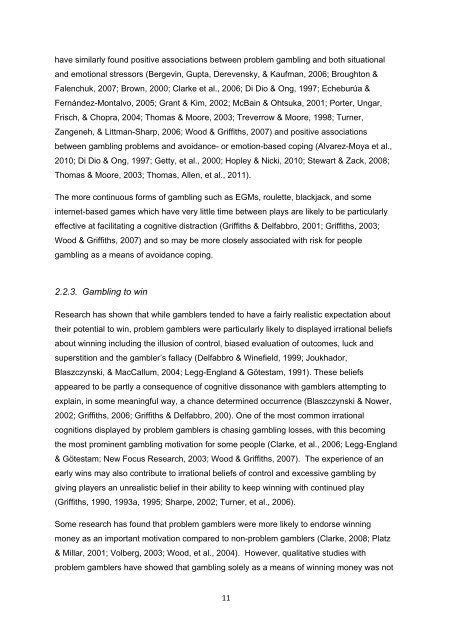Gamblers tell their stories: Life patterns of gambling
Gamblers tell their stories: Life patterns of gambling
Gamblers tell their stories: Life patterns of gambling
You also want an ePaper? Increase the reach of your titles
YUMPU automatically turns print PDFs into web optimized ePapers that Google loves.
have similarly found positive associations between problem <strong>gambling</strong> and both situational<br />
and emotional stressors (Bergevin, Gupta, Derevensky, & Kaufman, 2006; Broughton &<br />
Falenchuk, 2007; Brown, 2000; Clarke et al., 2006; Di Dio & Ong, 1997; Echeburúa &<br />
Fernández-Montalvo, 2005; Grant & Kim, 2002; McBain & Ohtsuka, 2001; Porter, Ungar,<br />
Frisch, & Chopra, 2004; Thomas & Moore, 2003; Treverrow & Moore, 1998; Turner,<br />
Zangeneh, & Littman-Sharp, 2006; Wood & Griffiths, 2007) and positive associations<br />
between <strong>gambling</strong> problems and avoidance- or emotion-based coping (Alvarez-Moya et al.,<br />
2010; Di Dio & Ong, 1997; Getty, et al., 2000; Hopley & Nicki, 2010; Stewart & Zack, 2008;<br />
Thomas & Moore, 2003; Thomas, Allen, et al., 2011).<br />
The more continuous forms <strong>of</strong> <strong>gambling</strong> such as EGMs, roulette, blackjack, and some<br />
internet-based games which have very little time between plays are likely to be particularly<br />
effective at facilitating a cognitive distraction (Griffiths & Delfabbro, 2001; Griffiths, 2003;<br />
Wood & Griffiths, 2007) and so may be more closely associated with risk for people<br />
<strong>gambling</strong> as a means <strong>of</strong> avoidance coping.<br />
2.2.3. Gambling to win<br />
Research has shown that while gamblers tended to have a fairly realistic expectation about<br />
<strong>their</strong> potential to win, problem gamblers were particularly likely to displayed irrational beliefs<br />
about winning including the illusion <strong>of</strong> control, biased evaluation <strong>of</strong> outcomes, luck and<br />
superstition and the gambler’s fallacy (Delfabbro & Winefield, 1999; Joukhador,<br />
Blaszczynski, & MacCallum, 2004; Legg-England & Götestam, 1991). These beliefs<br />
appeared to be partly a consequence <strong>of</strong> cognitive dissonance with gamblers attempting to<br />
explain, in some meaningful way, a chance determined occurrence (Blaszczynski & Nower,<br />
2002; Griffiths, 2006; Griffiths & Delfabbro, 200). One <strong>of</strong> the most common irrational<br />
cognitions displayed by problem gamblers is chasing <strong>gambling</strong> losses, with this becoming<br />
the most prominent <strong>gambling</strong> motivation for some people (Clarke, et al., 2006; Legg-England<br />
& Götestam; New Focus Research, 2003; Wood & Griffiths, 2007). The experience <strong>of</strong> an<br />
early wins may also contribute to irrational beliefs <strong>of</strong> control and excessive <strong>gambling</strong> by<br />
giving players an unrealistic belief in <strong>their</strong> ability to keep winning with continued play<br />
(Griffiths, 1990, 1993a, 1995; Sharpe, 2002; Turner, et al., 2006).<br />
Some research has found that problem gamblers were more likely to endorse winning<br />
money as an important motivation compared to non-problem gamblers (Clarke, 2008; Platz<br />
& Millar, 2001; Volberg, 2003; Wood, et al., 2004). However, qualitative studies with<br />
problem gamblers have showed that <strong>gambling</strong> solely as a means <strong>of</strong> winning money was not<br />
11


